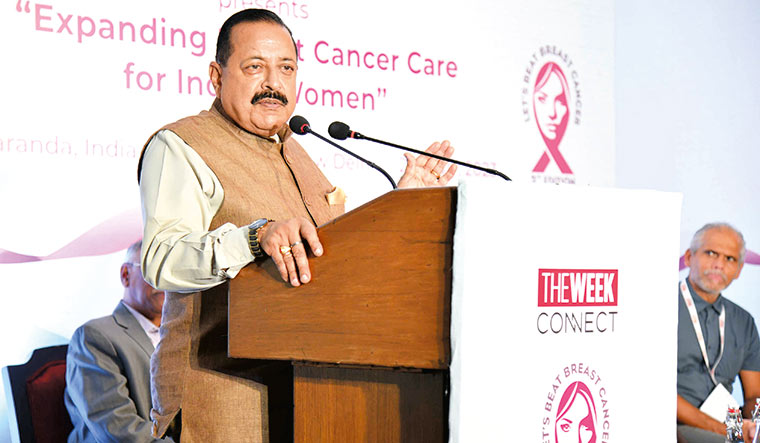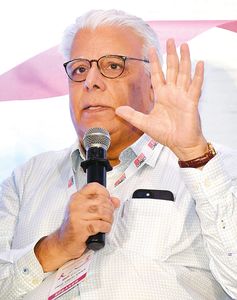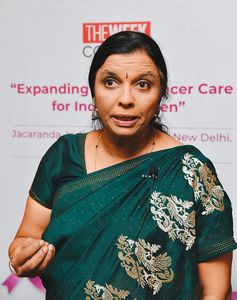There was a time when cancer was a rare disease. Today, it looms large and stares back at us. According to Union Minister Dr Jitendra Singh, 37.2 per cent women died of breast cancer in India in 2020, as compared with 34 per cent in Asia, while the global average that year was 30 per cent. Singh―who was the guest of honour at THE WEEK’s ‘Expanding Breast Cancer Care for Indian Women’ (second edition)―said the high mortality rates with breast cancer in India could be related to late diagnosis, which is primarily due to lack of proper awareness and the absence of screening for the at-risk population.
A diabetologist by profession, Singh also stressed on the importance of early detection to control type 2 diabetes, many lifestyle disorders, and breast cancer. While praising THE WEEK Connect’s breast cancer initiative and the magazine’s Health supplement, and congratulating Resident Editor R. Prasannan on the effort, the minister underlined that the Council of Scientific and Industrial Research (CSIR) labs, under the [Union] ministry of science and technology, are leading India’s cancer research efforts. He said the Central Drug Research Institute in Lucknow is leading the way in developing high-value generic drugs through non-infringing and cost-effective synthetic route, designing and synthesising of new chemical entities against clinically validated cancer drug targets, preclinical evaluation of potent anti-cancer entities, among other activities.
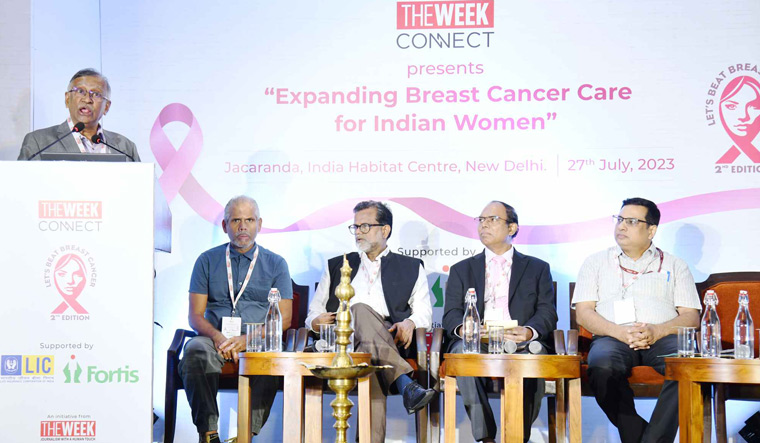 (From left) Delhi Resident Editor R. Prasannan, Ramesh S., Event Editor, The Week, former health secretary (Kerala) Rajeev Sadanandan, Anurag Srivastava of National Institute for Medical Sciences and Research, Jaipur and Joint Secretary (health) Vishal Chauhan | Sanjay Ahlawat
(From left) Delhi Resident Editor R. Prasannan, Ramesh S., Event Editor, The Week, former health secretary (Kerala) Rajeev Sadanandan, Anurag Srivastava of National Institute for Medical Sciences and Research, Jaipur and Joint Secretary (health) Vishal Chauhan | Sanjay Ahlawat
While the world might have come out of the shadow of the pandemic, the threat from non-communicable diseases is a glaring problem. Vishal Chauhan, joint secretary, ministry of health and family welfare, who was one of the guests at the event, noted how non-communicable diseases, particularly cardiovascular diseases and cancer, were the biggest challenge at the moment. But he said more people are conscious of health―the health ministry has been getting 25 per cent of all Parliament questions, of which 10 questions were being asked in Lok Sabha and Rajya Sabha every week. “That’s the level of policy thinking going on,” he said.
Singh said the parliamentary standing committee on health and family welfare had visited various cancer institutes all over the country for making cancer treatment available and affordable for everyone.
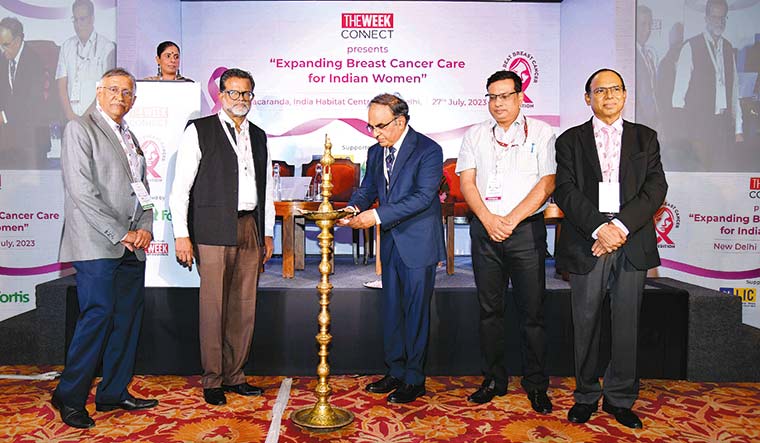 Prof Chintamani (centre), former head of surgery, Vardhaman Medical College, Safdarjung Hospital, lights the lamp. Also present were (from left) Delhi Resident Editor R. Prasannan, former health secretary (Kerala) Rajeev Sadananda, Joint Secretary (health) Vishal Chauhan and Anurag Srivastava of National Institute for Medical Sciences and Research, Jaipur | Sanjay Ahlawat
Prof Chintamani (centre), former head of surgery, Vardhaman Medical College, Safdarjung Hospital, lights the lamp. Also present were (from left) Delhi Resident Editor R. Prasannan, former health secretary (Kerala) Rajeev Sadananda, Joint Secretary (health) Vishal Chauhan and Anurag Srivastava of National Institute for Medical Sciences and Research, Jaipur | Sanjay Ahlawat
“We believe preventive and promotive health is very important. We need to change our lifestyle to beat non-communicable diseases, and no amount of alcohol or tobacco is safe. Rather, tobacco is the biggest risk factor for oral cancer. Our health and wellness centres prescribe yoga, cycling, Zumba at least 10 days a month. What we eat is also very important,” said Singh.
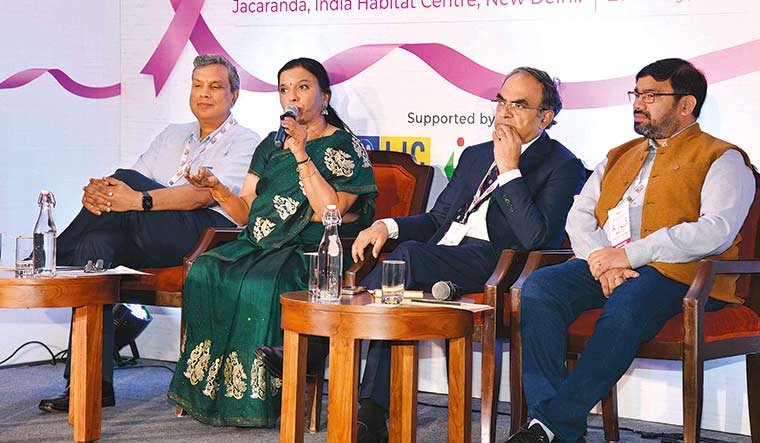 (From left) Prof Anurag Agrawal, dean, BioSciences and Health Research, Trivedi School of Biosciences, Ashoka University, New Delhi; Dr Geetha Manjunath, founder, CEO and CTO, NIRAMAI Health Analytix, Bengaluru; Prof Chintamani, former head of surgery, Vardhaman Medical College, Safdarjung Hospitai; Dr Anurag Varshney, vice president and head, Drug Discovery and Development Research, Patanjali Research Institute, Haridwar | Sanjay Ahlawat
(From left) Prof Anurag Agrawal, dean, BioSciences and Health Research, Trivedi School of Biosciences, Ashoka University, New Delhi; Dr Geetha Manjunath, founder, CEO and CTO, NIRAMAI Health Analytix, Bengaluru; Prof Chintamani, former head of surgery, Vardhaman Medical College, Safdarjung Hospitai; Dr Anurag Varshney, vice president and head, Drug Discovery and Development Research, Patanjali Research Institute, Haridwar | Sanjay Ahlawat
When it comes to the treatment of cancers through radiotherapy, the World Health Organization (WHO) recommends that there should be one radiotherapy machine for 10 lakh population. “By that measure, India should have about 1,300-1,400 machines but we have only about 650,” said Chauhan. He lists out states like Uttar Pradesh, West Bengal, and Odisha that suffer on this account. “But, southern states are better equipped,” he said.
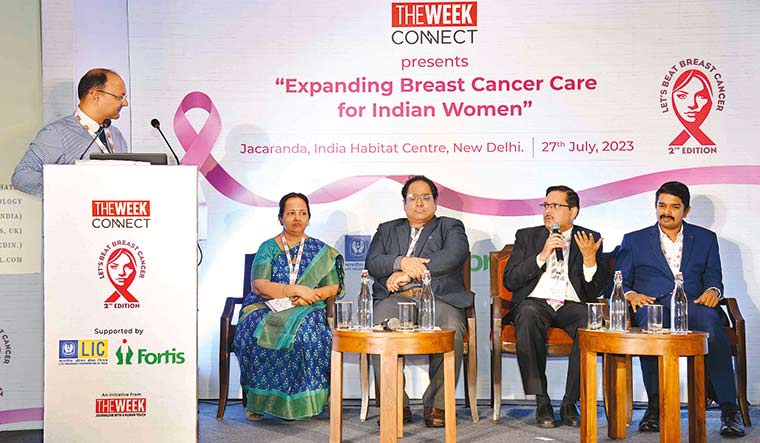 (From left) Dr Nitesh Rohatgi, senior director, Medical Oncology, Fortis Memorial Research Institute; Dr Vineeta Goel, director, Radiation Oncology, Fortis Memorial Research Institute; Dr Vineet Govinda Gupta, senior consultant, Medical Oncology, Fortis Shalimar Bagh; Dr Vedant Kabra, principal director, Surgical Oncology, Fortis Memorial Research Institute; Dr G. Arun Kumar, therapy area medical expert, Roche Products India (Pvt) Ltd | Sanjay Ahlawat
(From left) Dr Nitesh Rohatgi, senior director, Medical Oncology, Fortis Memorial Research Institute; Dr Vineeta Goel, director, Radiation Oncology, Fortis Memorial Research Institute; Dr Vineet Govinda Gupta, senior consultant, Medical Oncology, Fortis Shalimar Bagh; Dr Vedant Kabra, principal director, Surgical Oncology, Fortis Memorial Research Institute; Dr G. Arun Kumar, therapy area medical expert, Roche Products India (Pvt) Ltd | Sanjay Ahlawat
There is always a silver lining. In the last seven to eight years, the number of undergraduate and postgraduate seats have doubled in the country for medical students, which signals a brighter future for medical sciences in the country.
Another drawback in cancer care in the country remains late diagnosis. Professor Vinod Raina, chairperson of oncosciences, Fortis Gurugram and ex-chief of Delhi Cancer Registry, said that people do not go for checkups in early stages. The problem fosters when the lump becomes large and the diagnosis is late. However, he notes that this is changing in metros as an increasing number of women are going for examination after 40-45 years of age. “In younger women, the breast is dense. So, mammograms might not be very useful in detecting, but after 45 years of age, it works,” said Raina.
Dr V. Seenu, senior professor, department of surgical disciplines, AIIMS, Delhi, said that breast cancer had surpassed lung cancer in the country but is three to four times lesser than in the US. The only difference, he said, was in the fact that people get screened often in the US, but in India, they go for tests only when there is a prominent lump, which leads to a poor survival rate in breast cancers.
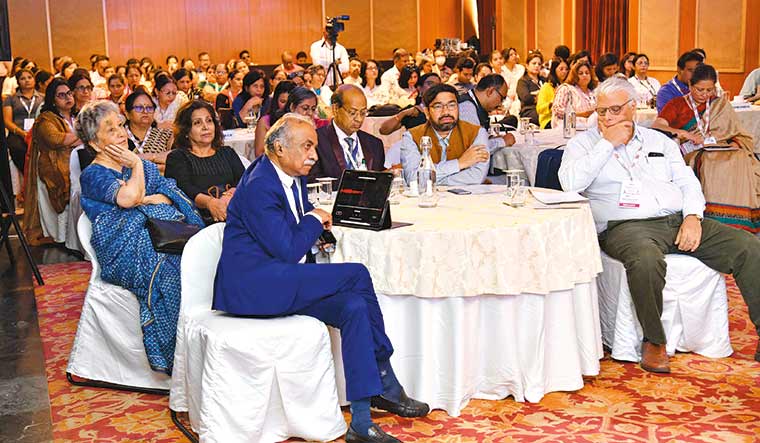 Get screened: Various sessions at THE WEEK’s second edition of ‘Expanding Breast Cancer Care for Indian Women’.
Get screened: Various sessions at THE WEEK’s second edition of ‘Expanding Breast Cancer Care for Indian Women’.
Talking about the root cause of cancers, Dr Chintamani, former head, department of surgery, Vardhman Mahavir Medical College and Safdarjung Hospital, Delhi, notes that a healthy vegetarian diet and a healthy lifestyle could reduce the risk of cancers to a great extent.
Elaborating on healthy life practices, Dr Bhawna Sirohi, director, medical oncology, Balco Medical Centre in Nava Raipur, gave some golden tips to lead a good lifestyle. “The diet has a very important role to play. One must avoid tobacco, alcohol, processed food, supplements, sugar, and breastfeed for one or two years, do yoga and exercise,” she said. According to her, walking solely will not reduce the risk, she suggests an exercise regime that makes one’s heart rate go up, or brisk walking. “One must also know their family history of cancers. I suggest eating at least two hours before sleep and getting screened,” said Sirohi.
Seconding her was Dr Anurag Varshney, vice president and head, drug discovery and development research, Patanjali Research Institute, Haridwar, who also talked about the importance of consuming a vegetarian diet to avoid the risk of cancers. He noted that the research and testimonies of cancer patients at their institute revealed that a complete ayurvedic treatment for cancer, if detected early, could eradicate the disease as effectively as the allopathic medicinal and radiation treatments. However, he favoured a preventive approach through an ayurvedic lifestyle and yoga to avoid the risk of cancers.
While screening might not be a viable option for all due to several limitations, technology is bridging the gap in ensuring cancer testing goes on unhindered. Dr Geetha Manjunath, founder, CEO and CTO, Niramai Health Analytix, Bengaluru, has developed an artificial intelligence (AI) model to facilitate the same. When her close aides succumbed to breast cancer, it inspired her to do something about women who lose their lives to the disease. She developed thermal imaging process to detect cancers. Geetha, who has over 25 years of experience in IT innovation, has developed a breakthrough AI-based test that detects early stage breast cancer in a non-invasive radiation-free manner. The technique can be used to also detect cancers as small as four millimetres, which is stage zero cancer, she said. “AI can analyse a lot of data, and imaging can look at high resolution information about the body. The best application of AI in health care is in radiology,” she said.
While tests help detect cancers, medical practitioners also suggest self-examination as a first step towards determining it. Dr Navneet Kaur, professor of surgery, University College of Medical Sciences and GTB Hospital, Delhi, said that self-examination means checking for lumps on the breast, which every woman must do every few months. “When diagnosed, many people are initially in denial and seek second opinions and some ignore it leading to a delay in treatment. The state of public hospitals, too, leads to a lot of delay in treatment, which may lead to advanced stages. While treating a patient, it is the responsibility of the doctor to be transparent and also of the patient to do some research before consultation to ask the right questions. It is important to know the perspective of the patient―if they want to save costs, remove the whole breast, save a part of it or not burden the family,” said Kaur.
The initiative, sponsored by LIC and Fortis, was held on July 27 at the India Habitat Centre in Delhi.


